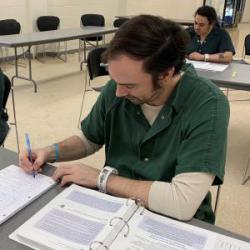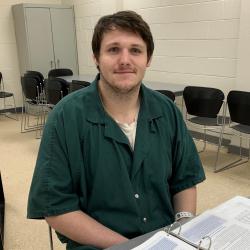August 5, 2021
“If I can get one thing out of this program, it’s that I can smile again,” says Matt, an inmate participant in the Fairfax County Sheriff’s Office STAR (Striving to Achieve Recovery) program in the Adult Detention Center. “I want to lead a happy, sober life.”
Matt and six other STAR participants recently started peer recovery specialist training, developed by the Virginia Department of Behavioral Health & Developmental Services. Nick Yacoub, a certified peer recovery specialist with the Community Services Board, teaches the class and helps lead the STAR program.
“We are going to have a comfort agreement,” says Yacoub on the first day of class. “Everyone’s needs are valued. No one is better or above anyone else.” He reminds the group that they are normal people who happen to experience a lot of abnormal things in their lives.
The class discusses why peer support is important to them. “Since they [peers] did it, so can I,” says Joe. “Psychiatrists couldn’t relate to what I was experiencing,” adds Dana. “Peer recovery specialists can guide me to where I want to be.
 Matt has been in the STAR program since mid-March and just finished Phase 1. He explains that the initial phase built a solid foundation and education for recovery and exposed him to different recovery programs and approaches that he could apply to his own life. He also began working with a sponsor from Alcoholics Anonymous (AA) and attending AA meetings regularly. He credits the peer recovery specialists with giving him hope.
Matt has been in the STAR program since mid-March and just finished Phase 1. He explains that the initial phase built a solid foundation and education for recovery and exposed him to different recovery programs and approaches that he could apply to his own life. He also began working with a sponsor from Alcoholics Anonymous (AA) and attending AA meetings regularly. He credits the peer recovery specialists with giving him hope.
Matt is a lieutenant colonel in the Air Force. He is a pilot, having deployed and flown in three different wars with over 1,000 combat hours. After abusing alcohol for several years early in life, he chose recovery in 2006 and was sober for the next 12 years. The stresses of the military and issues in his personal life led to a relapse with alcohol and an encounter with the criminal justice system.
“I own my mistakes,” says Matt, “and I want to make the changes necessary to prevent this from ever happening again.” He is thankful for the STAR program. Naming CSB and Sheriff’s Office staff as true professionals, he says they raise the level of positivity every day. “I was dwelling on my own issues instead of what I had to be grateful for – my daughters, parents, siblings and their families.”
All of the STAR participants agree that the biggest lesson to be learned is that they can control only two things: their own actions and their own attitudes.
What are Matt’s plans for the future? He will attend 90 AA meetings in 90 days and spend time with his AA sponsor. As for his professional life, he hopes the Air Force will let him retire after 23 years of service once he demonstrates a post-incarceration, sustained recovery.
 Harley is also an inmate participant in STAR and the Peer Recovery Specialist class. “I’ve been indecisive my whole life, but I know I want to help other addicts like me get into recovery,” he says. The STAR program has taught him to be more tolerant of other people’s behavior and to have tolerance for his own failures.
Harley is also an inmate participant in STAR and the Peer Recovery Specialist class. “I’ve been indecisive my whole life, but I know I want to help other addicts like me get into recovery,” he says. The STAR program has taught him to be more tolerant of other people’s behavior and to have tolerance for his own failures.
“I’ve changed quite a bit since coming to STAR a year ago,” says Harley. “My attitude was so bad I almost got kicked out of the program.” He says that the jail teaches structure, while the STAR program teaches a new way of life. He has learned self-control. “Anger is a behavior I have to correct, and it takes practice. I have to re-think things and not jump to quick conclusions.”
Harley’s mother was addicted to heroin and overdosed when Harley was 19. “After my mom died, I didn’t care about my life. I was homeless on and off until I was 24, when I came to jail. “I don’t want to be homeless and known as a nobody. I’ve done enough of that.”
Harley’s goal when he gets out of jail is to go to college and learn the clinical side of recovery to complement the hands-on lessons he has learned from STAR. He wants to start his own treatment center and put that education and experience to good use.
“Addiction is a disease and should be treated as such,” says Fairfax County Sheriff Stacey Kincaid, who launched the STAR program in November 2018. “There is no easy solution, but with clinical and peer supports, including trauma informed care, people can and do recover from addiction.”
Kincaid says the STAR program is successful because it helps each participant find what works best for them. “It’s not one size fits all,” she says. “I am hopeful that once they are released from our custody and are back in the community, they will use their training and experiences to help others find their way to a lifestyle of recovery.”

